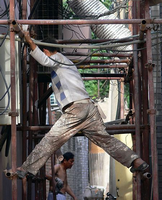Americans' fear of China right now is palpable. We see danger in its products, in its vast reserves of our currency, in its growing military might, in its ravenous hunger for raw materials, and in its single-party state. With "Made in China" seemingly stamped on the bottom of everything we bring into our already overstuffed houses, we worry that China will soon buy and sell us, just like Japan seemed poised to do two decades ago.
In short, we no longer feel on top of the global economy. It's somebody else's "age."
Roughly a century ago, that's exactly how the British felt about America. The United States was the "rising China" of that age, catching up to and, in many categories, surpassing its model, Great Britain. And just as today's Americans feel that they use Chinese products to the exclusion of all else now, the same sentiment was prevalent among the British regarding American goods at the beginning of the 20th century. Consider this account from Edmund Morris's prize-winning biography of Theodore Roosevelt, "Theodore Rex":

